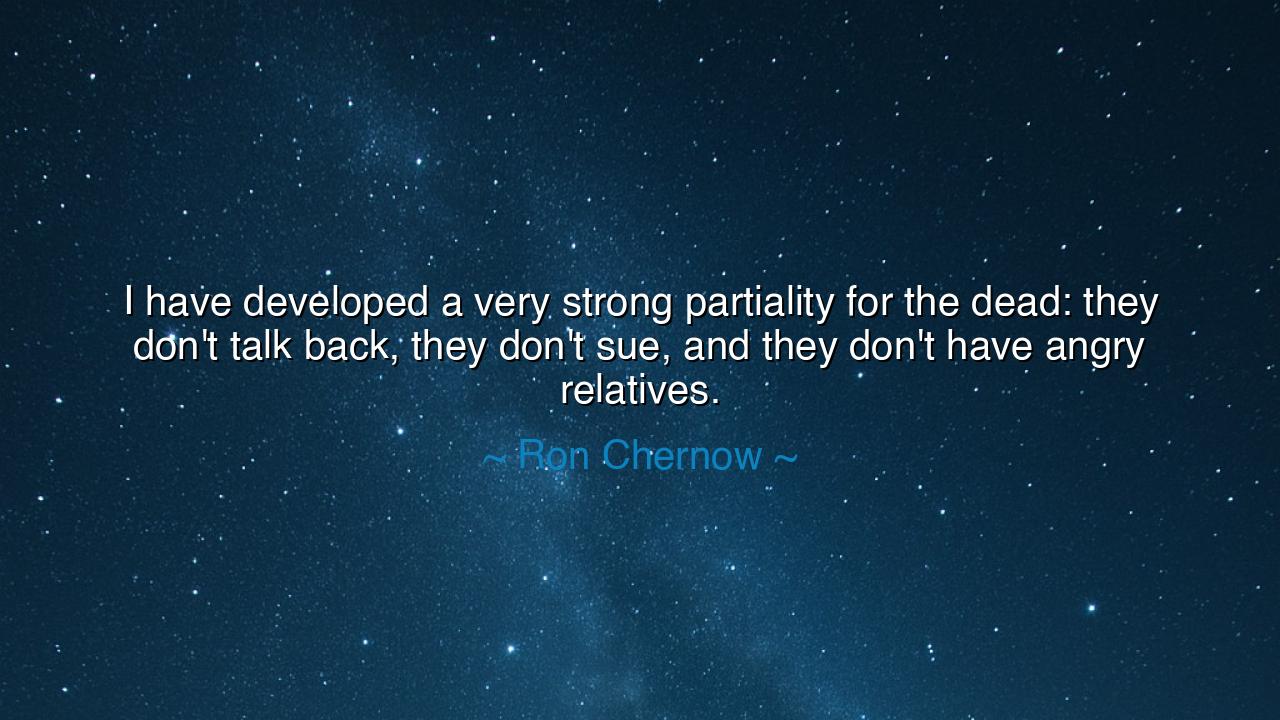
I have developed a very strong partiality for the dead: they
I have developed a very strong partiality for the dead: they don't talk back, they don't sue, and they don't have angry relatives.






Hearken, children of the ages, to the words of Ron Chernow, the sage of history and reflection: "I have developed a very strong partiality for the dead: they don't talk back, they don't sue, and they don't have angry relatives." Here lies a teaching both wry and profound, a meditation on the permanence of legacy, the silence of those who have passed, and the clarity that comes from studying lives no longer entwined with mortal quarrels.
Know that in these words there is humor and insight. To hold a partiality for the dead is to seek wisdom in history, to engage with truth untarnished by reproach or complaint. Chernow teaches that the lives of those who have departed offer a mirror of human nature, of achievement, folly, and virtue, free from the tumult of contemporary judgment or familial discord. The ancients would counsel that the study of the past is both safer and more enlightening than entanglement with the present’s uncertainties.
Yet, consider also the subtle wisdom in detachment. The dead speak through their deeds and words preserved, not through argument or litigation. To observe them is to learn without interference, to glean insight from choices and actions rather than the noise of dispute. Chernow’s reflection reminds us that the relatives of history may cloud perception with emotion or bias, whereas the departed themselves offer lessons unfiltered and enduring.
And behold, there is heroism in contemplation. To turn one’s attention to the dead is to honor memory, to seek knowledge, and to cultivate patience in understanding. Chernow’s insight teaches that reflection upon lives concluded can guide the living, offering wisdom born of experience, courage, and sometimes folly, without the burdens of conflict or recrimination.
Thus, remember, future generations: the study of those who have passed is a path to insight and clarity. To favor the dead is not to diminish the living, but to find the calm waters of reflection, where judgment is unclouded, lessons are distilled, and the eternal truths of human nature stand revealed.
In the end, the ancients would say: treasure the stories of the departed, for they speak without obstruction, teach without quarrel, and illuminate the human path. To hold a partiality for the dead is to embrace the guidance of history itself, learning from what was, while walking wisely among what is.






DDangNam
This quote is clearly meant to be funny, but I wonder if there’s an underlying message about the burdens of human relationships. It suggests that dealing with the living can be more stressful than dealing with the dead. But is that a fair comparison? What does this say about the person's attitude toward conflict, responsibility, and emotional labor? Does this attitude point to a deeper exhaustion or avoidance of life’s complexities, or is it just a lighthearted joke?
BDBich Dao
While this quote might be taken humorously, it also makes me think about how society often idealizes death as a peaceful escape from life's stresses. Is it wrong to look at the deceased as a sort of sanctuary, free from conflicts and obligations? But then again, isn’t life also about facing these challenges and building connections, even if they come with conflicts? Maybe there's a balance to be found between embracing the messiness of life and seeking peace in solitude.
VBvinh bui
I find this quote both funny and cynical. It seems to reflect a certain frustration with the living, particularly in how they complicate matters. But what does it say about the person saying it? Do they prefer the simplicity of death over the unpredictability of life? Maybe it's more about avoiding the emotional burden of relationships, but isn’t that an unhealthy way to look at life and death? I wonder if this quote underestimates the value of meaningful connections.
HHuyen
This quote is humorous but also quite thought-provoking. It highlights the ease of dealing with those who are no longer living, but doesn’t it also point to a certain discomfort with the messiness of human relationships? It almost suggests that, in a way, death can bring peace—no arguments, no drama. But is this view healthy, or does it reflect a desire to escape the complexities of life? Could it be that people who say such things are avoiding the emotional work that living relationships require?